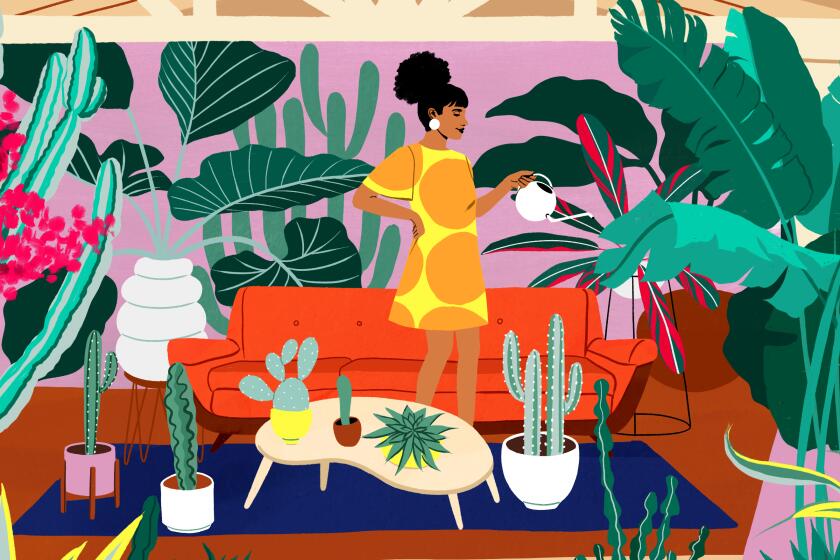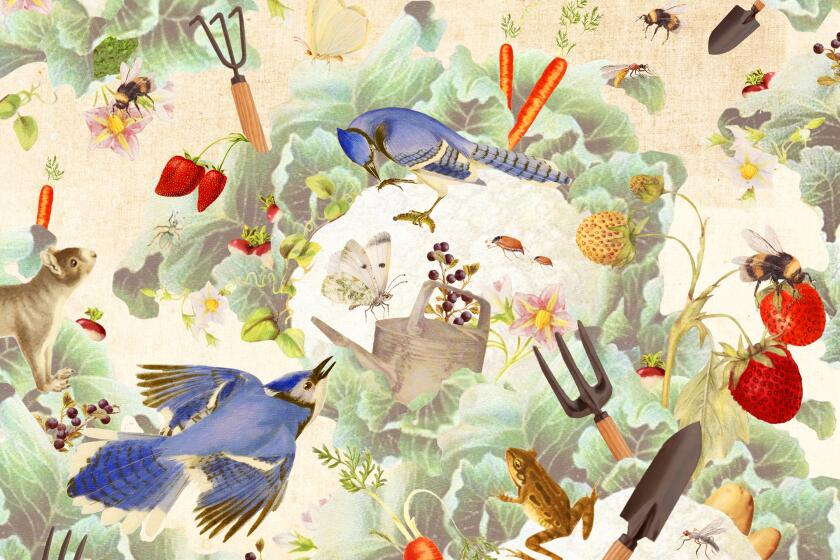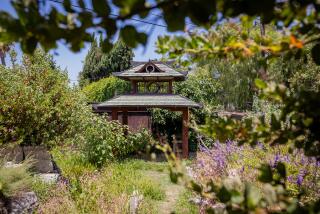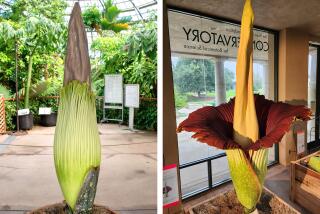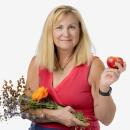A dash of ‘Great British Baking Show.’ A helping of flowers. The result? ‘Full Bloom’
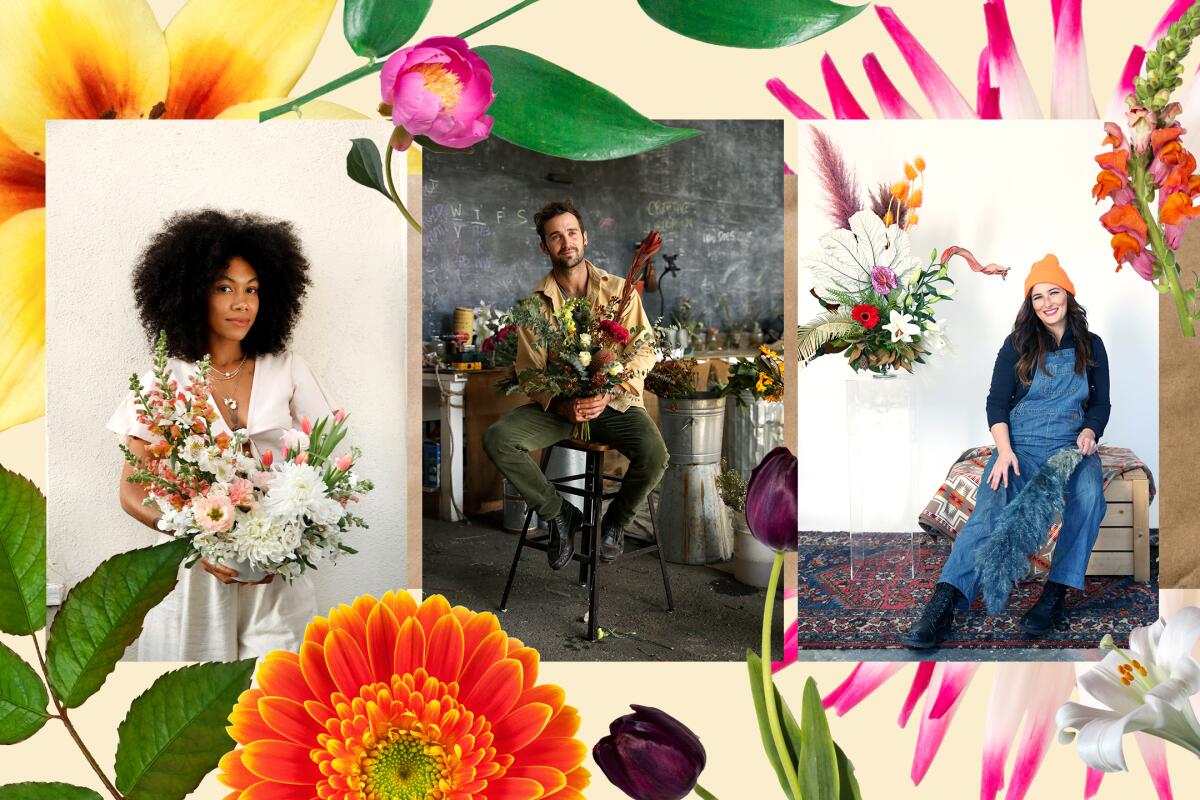
Between election uncertainty, COVID-19, financial woes, social upheaval and an absolutely raging exhaustion after just 10 minutes with the news, you know what could really help us right now?
Flower arranging.
Or to be more precise, watching 10 talented floral “artistes” put together beautiful displays in a competition format similar to “The Great British Baking Show,” except instead of puddings and biscuits these contestants must assemble a variety of fantastic creations from flowers.
“It’s surprisingly relaxing,” said Wes Dening, partner of Eureka Productions and executive producer of its new show, “Full Bloom,” which premieres Nov. 12 on HBO Max.
“We thought we could tap into the creativity of arranging flowers, but after watching a lot of people arranging flowers on YouTube, we were sucked in after 10 minutes and discovered it’s also very therapeutic, watching someone bring something beautiful to life.”
Dening and his partners have made other reality-show contests, such as “Holey Moley,” a mini-golf competition on ABC and “Dating Around,” a Netflix series based on dicey first dates, but as they were casting around for ideas for a new series one of the partners, Paul Franklin, said his wife Rachel had been watching YouTube videos and suggested they consider a flower show.
Gardening guides, houseplants, native species, flowers, forests and lawns.
“So Paul and myself Googled ‘flowers’ and discovered there was flower-arranging content all over the web. And the more we dug into it, it just felt like this was a skill no one had tapped for TV. We found people are completely obsessed with flowers and have been for a long time if you look at social media. It’s just been slow to get to the television world.”
Eureka, which has offices in Los Angeles and Dening’s native home, Australia, has been protective about releasing early episodes or even a trailer of “Full Bloom,” which was shot outdoors in the August heat at its studio in Simi Valley. But here are the basics:
The show starts with 10 contestants — three of whom are based in Los Angeles — who are given a series of solo challenges and team challenges. Every episode one contestant is sent home, and at the end of the eighth episode the last artiste standing is the winner of the $100,000 grand prize.
Here are things plant lovers can do this month and next, from holiday shopping to classes in fall planting, in and around L.A.
This is a gentle competition between the contestants, said Dening. “It’s not a stem-throwing fistfight. It’s not about you going to snap the necks off your competitors’ orchids while they’re not looking.”
But there is a competitive spirit. “We didn’t just want a soft warm-feeling flower show,” he said. “We wanted it to have some teeth, so we wanted to find people who would not only be willing to compete on the show but take it seriously and want to win.”
The cast and crew had to sequester themselves at a nearby hotel when they weren’t filming to keep everyone safe from the coronavirus, and rumor is that it got so hot on the set, some people came close to passing out. That’s not the best environment for delicate flowers, so that provided an extra challenge for the contestants.
But the judges are legit big-name florists — Simon Lycett of London, whose A-list celebrity clients include the royal family (he did the flowers for Prince Charles’ second wedding); Elizabeth Cronin, owner and founder of the famed Asrai Garden floral shops in Chicago; and Maurice Harris of Bloom & Plume in Los Angeles, who hosted the talk show “Centerpiece” on the short-lived Quibi streaming service and was a floral designer on Beyoncé’s visual album, “Black Is King.”
Maybe your first-ever victory garden wasn’t a smash success this summer, but don’t give up now. Fall is prime planting time for edibles in Southern California, a more forgiving time with fewer demands for water or worries about scorching your plants. Now is the time to plant berries for spring harvest as well as a lush palette of greens, root crops, peas and brassicas for harvest throughout the winter.
The show premieres with two episodes Nov. 12, with two more episodes dropped every week until it’s done. No, they won’t reveal who won the big prize. And yes, the format does resemble a certain famous baking competition, but Dening insists this is not just a floral repeat of “The Great British Baking Show.”
“We get that reference a lot because people love that show; it’s like getting a warm hug,” Dening said. “But we definitely explore character a lot more than the traditional reality show. We really get to know our contestants.”
These contestants are not established professional florists but people with a passion for flowers just starting their careers, Dening said. The producers received hundreds of applications from people who wanted to appear.
“We had them make arrangements in their homes, and once we got to know them and vetted them, we brought the 20 best to L.A., where they all went through a series of challenges and were assessed by professional florists,” Dening said.
The survivors of that process were the 10 contestants who made it on the show. All the contestants are from the United States, but “we found people from all backgrounds, race and ethnicities, in their 20s to 40s,” he said. “One contestant in her mid-40s is a mum who started her career in the corporate world and left to tap into her dream to become a florist.”
Like most reality TV competitions, “Full Bloom” has several ways to suck in viewers, whether they have a green thumb themselves “or just like to watch,” Dening said, by getting them hooked on contestants’ personal stories, providing regular tips for their own home arrangements or just letting them sit back with some pizza and soda while people create stunning floral arrangements under trying conditions and limited time.
“It’s beautiful to watch, almost mesmerizing to watch,” he said. “And each show is loaded with take-aways.”
The show has a full team of floral experts who create the challenges and advise what raw materials to provide, Dening said, “so it’s not just made up by a bunch of television producers.”
And it has plenty of pathos. “One thing I didn’t realize was that floristry is such an emotional art form,” Dening said. “The tears and emotions we see when the artists bring up their arrangements for judging is really overwhelming. They put their heart and souls into these arrangements and over the series you see how they grow exponentially.”
He added that there will be plenty of surprises: “Some of the contestants you expected would be cut in the first episode or two are still there till the end.”
One of his favorite parts about the show is how it pushes the contestants to go outside their comfort zone to try something new. “We keep encouraging them to take risks,” Dening said. “Everything from creating a floral illusion floating inside a larger frame to making spectacular arrangements from flowers you can only find in supermarkets, which is where the vast majority of Americans get their bouquets.”
His greatest hopes for the series? “It’s a highly skilled competition and, without sounding too lofty, we want you to see ambitious florists push the boundaries of the art form in floral arranging,” Dening said. “We hope we can showcase the magic of flowers. We hope people will find the show as a place to relax and escape from the modern world. We hope it’s meaty and people will want to sink into all the episodes and find it entertaining, whether they are aspiring florists or not.”
Our own floral challenge
We asked “Full Bloom’s” three L.A.-based contestants to give us a sense of their style and some flower-arranging tips by asking them to use easy-to-come-by materials to decorate a holiday table for $40 or less.
Two of the contestants, Spencer Falls of the Unlikely Florist in Venice, and Schentell Nunn of Offerings in West Adams, came up with spectacular floral arrangements for the table or sideboard and then de-structured them to make similar creations possible for mere morals. Kristen Alpaugh of FLWR PSTL in Santa Monica, opted to create pendants or charms out of plants encased in brittle-clear isomalt sugar, a quick and easy technique that can preserve colorful leaves, greenery or even Christmas trees cut out of magnolia leaves to scatter on the table, accompany every napkin or hang from wine bottles or chandeliers.
A few tips we learned from these semi-pros:
— All three prefer to use ceramic vases or containers, to keep the focus above the water. A glass vase might be pretty, but it exposes the underpinning of your display, which is not always beautiful and can distract from your final arrangement.
— When you get your flowers home, cut the stems at an angle, about an inch from the bottom, so they can more easily absorb water until you’re ready to start arranging. Put them someplace cool, away from direct sun.
—If you are a fan of tulips, trim them in the same way, but keep tulips in their plastic sleeve until you are ready to arrange; if they get too warm, their slender necks tend to flop.
—Keep your flowers in cold water unless you want to force open some blooms. Warm water opens buds like tulips and lilies more quickly, but be prepared for the entire arrangement to be spent more quickly.
— Don’t be afraid to experiment; you will probably end up with more flowers than you can use in one arrangement, so make multiple arrangements or share your flower arranging with a friend or neighbor.
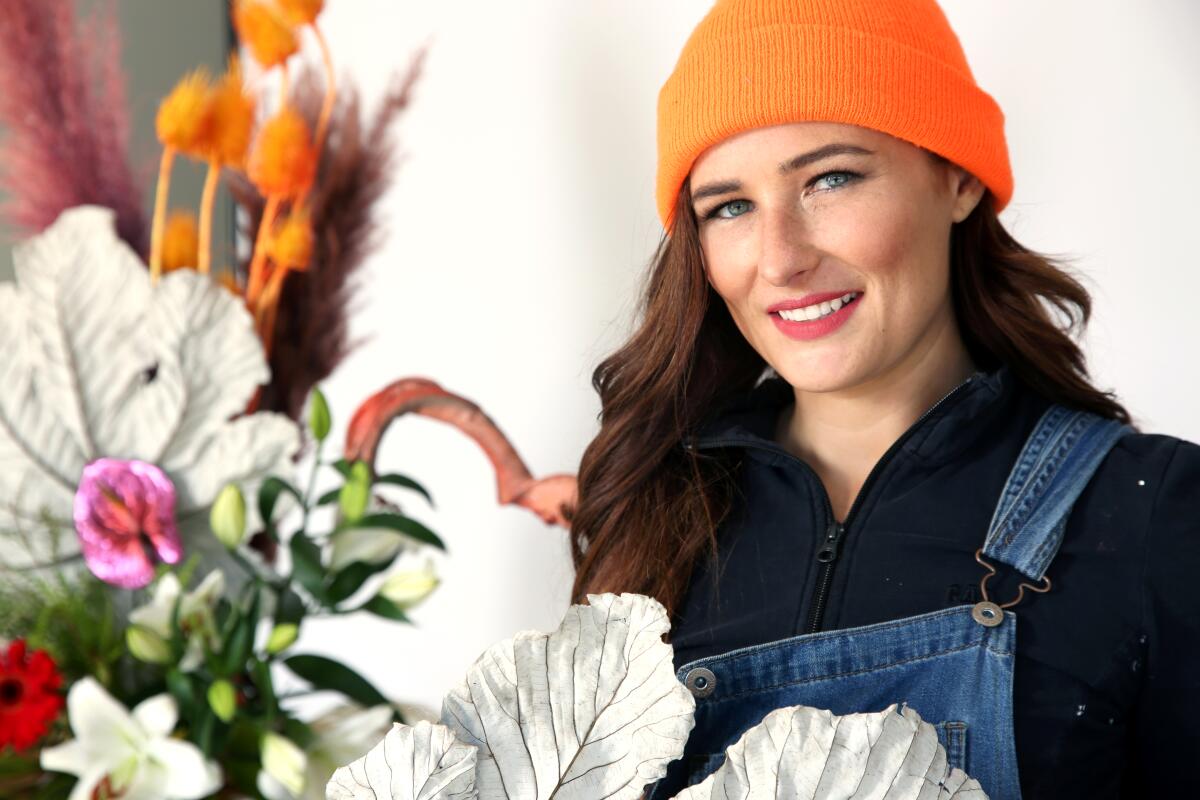
Kristen Alpaugh, 31
Kristen Alpaugh calls herself a “botanical artist,” as her Instagram account — @flwrpstl — makes clear pretty quickly. Here is a “100% self-taught” florist who literally paints petals and leaves to create the look she desires. “My work is bold, colorful and unapologetic, like ‘in your face’ flowers,” she said, making her a good fit for clients such as Katy Perry, who wore an Alpaugh-designed floral “gown” in “Never Worn White,” the music video she released in March that unofficially announced her pregnancy.
Alpaugh says she has always considered herself an artist, “but never had the courage or confidence to pursue it as a career. I didn’t grow up with a lot and my mom wanted us to have better lives, so art didn’t seem like a viable life choice.” She went to college on scholarship, got her degree in psychology and went into event planning, doing well enough that when one of her bosses broke away 10 years later to start his own business he brought her along.
“I had great paychecks, good health and good healthcare, but it just didn’t feel right,” she said. “I was checking all the boxes but I sort of fell out of love with my work.” So she quit her job, did some soul searching and climbed Mt. Kilimanjaro (Africa’s highest peak), and then decided she was going to work with flowers.
“I didn’t know anything about them, except I knew I loved them,” she said. “I tried to be a traditional florist, where everyone puts four roses in a vase with some baby’s breath, but those all looked the same, so what’s the fun in that? So I did what I always have to do; I had to make it my own.”
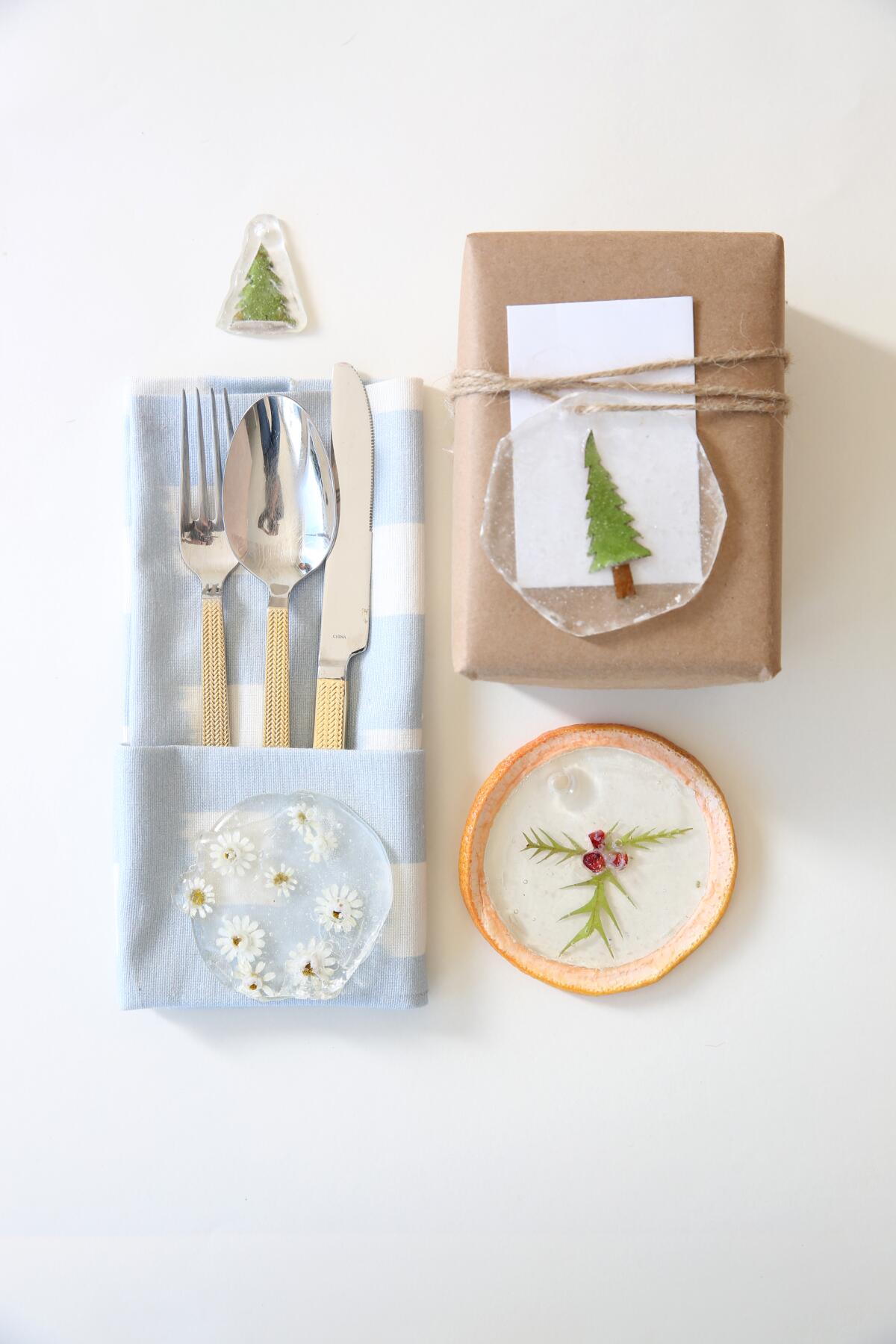
While her painterly flowers might seem intimidating, her pendants are fun, inexpensive and easy to make. If you’d like to try, the only required purchase is isomalt sugar, available at kitchen specialty shops or online (about $12 for 16 ounces). While waiting for the sugar to arrive (delivery is usually within 2 days), wander your yard (or the gardens of willing neighbors) to start choosing the plants you want inside. For Thanksgiving, find some beautiful fall leaves to spotlight, or for Yule-time events mix snippets of beautiful greenery with non-juicy berries or cut out shapes from magnolia leaves, which are a deep green on one side and a lovely saddle brown on the other. You can also try a handful of chamomile flower “stars.” Just stay away from anything juicy since water causes the sugar to break down.
Alpaugh used grapefruit, cut into quarter-inch rings with the fruit part removed, as her molds. Isomalt sugar melts and hardens quickly, so it’s best to work in small batches or have all your molds and ingredients ready. Measure 1 1/2 to 2 cups of isomalt sugar in a glass measuring cup, cover with plastic wrap and microwave on high for three minutes (watch carefully so it doesn’t burn). While the sugar is melting, spray a piece of parchment paper and the grapefruit mold with a nonstick spray, then when the sugar is ready (it should look like a translucent syrup), pour a small dollop in the middle of the mold, add the bits of plants you want to highlight and then cover all that with another coating of the sugar. It takes a couple of minutes for the sugar to harden, so when the sugar is firming but still pliant, use a chopstick to create a hole (for ribbons or string). Let it harden and then remove and reuse the rind or keep it on, as you choose.
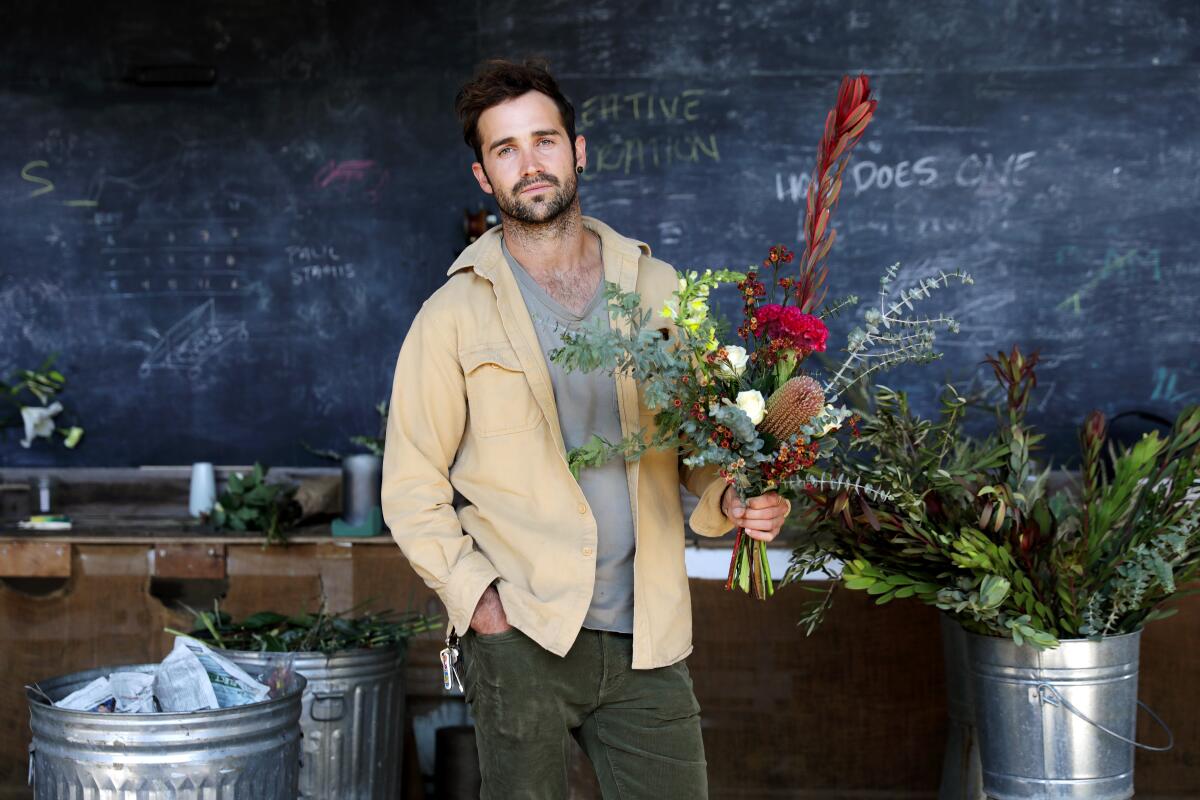
Spencer Falls, 31
Spencer Falls grew up on an orchard in New Zealand. His mother is a fine artist from the U.S., and his dad a farmer, so he figures he blended a bit of both to start his business, the Unlikely Florist, in Venice. But he had a few detours along the way, such as a stint as a semi-pro snowboarder near Lake Tahoe, then a spell of grueling work on a lobster boat in New England, then a humbling taste of trying to become an actor in Los Angeles while waiting tables to pay the bills.
One day in 2016, when the acting opportunities seemed particularly slim, Falls said he took stock. “I knew I wanted to be creative, so I began thinking, ‘How can I creatively make some money?’ I had this VW van — that I still have — and I looked up and down Abbot Kinney and realized there were no florists, so I started going to the flower market downtown, buying flowers and selling them from my van. I thought, ‘If I can’t get the acting job I want in this town, maybe I can play the character I want — the unlikely florist — and I ultimately became one.” Fans started following on Instagram, @theunlikelyflorist.
That “role” turned out to be a hit, with Falls selling enough flowers that he began a subscription service and ultimately moved from his van to a large studio space in an old Venice garage, but by then his style as a florist had been shaped by what he learned in his van.
“If you sell flowers out of a van, it means no real refrigeration, so you need to have flowers that will last in the heat, in the sun, and that ultimately started to inform what flowers became my favorites,” Falls said. “A great deal of my identity as a florist is long-lasting, robust, drought-tolerant flowers that last a lot longer while they’re fresh on someone’s table, and go on to become beautiful dried flowers too.”
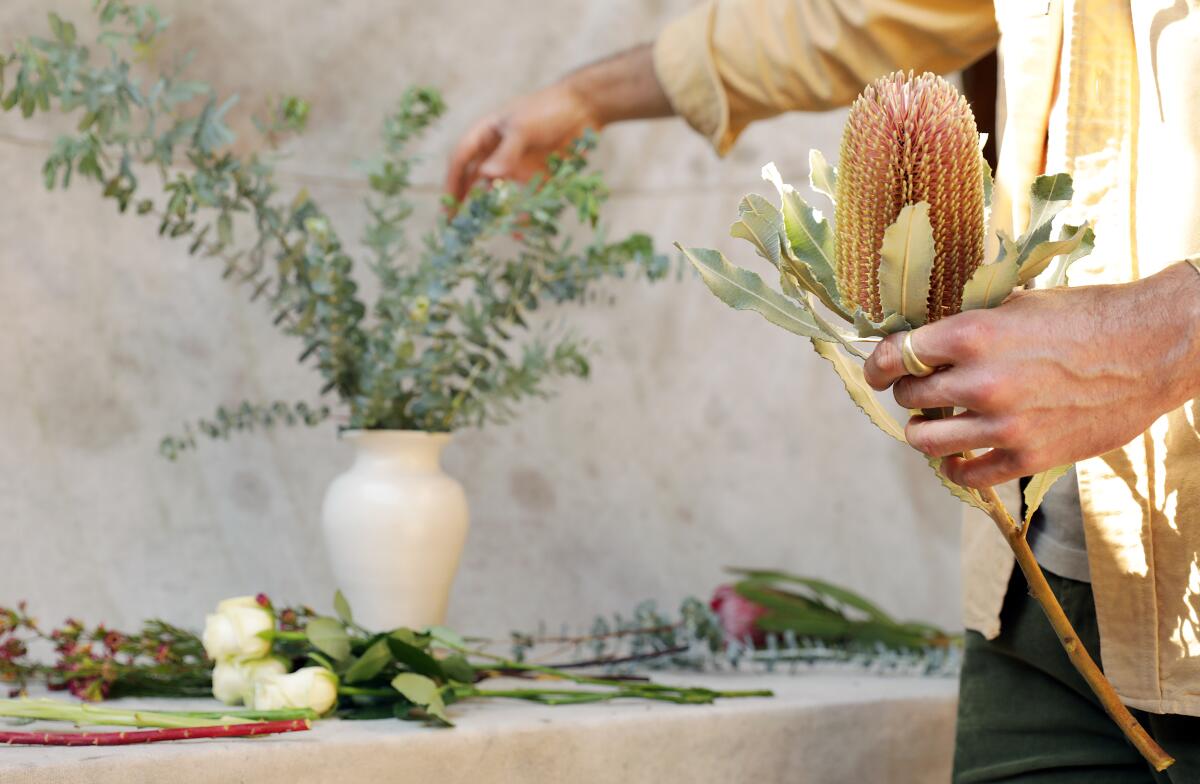
For his holiday arrangement, Falls chose flowers and greenery from the Santa Monica Farmers Market. He started with several airy but substantial branches of baby blue eucalyptus and acacia greenery to create a “foundation” for the arrangement, which he put in a shapely cream-colored ceramic vase. Next he added three “showstopper” blooms in the center that rise like stair steps — a bristly strawberry banksia, a brain-shaped, deep raspberry celosia, and a tall branch of leucadendron with its slender green waxy leaves tipped in raspberry. And then a few filler stems of color: four cream-colored roses, a tall stem of pale yellow snapdragons and a couple sprays of lemon-and-raspberry-colored wax flowers.
One benefit of this display is that most of it can be hung upside down after your event and dried, Falls said. He suggests starting with a simple but solid selection of greens, and then look for one or two large “showstopper” flowers with a complexity of colors you can build around, like the banksia whose ruby interior seems to glow out through its thicket of pale peach bristles. Use a few different filler flowers to complement those complex colors, and remember, with these kinds of arrangements less is more. You don’t want to overpower your strongest flowers with too much frill.
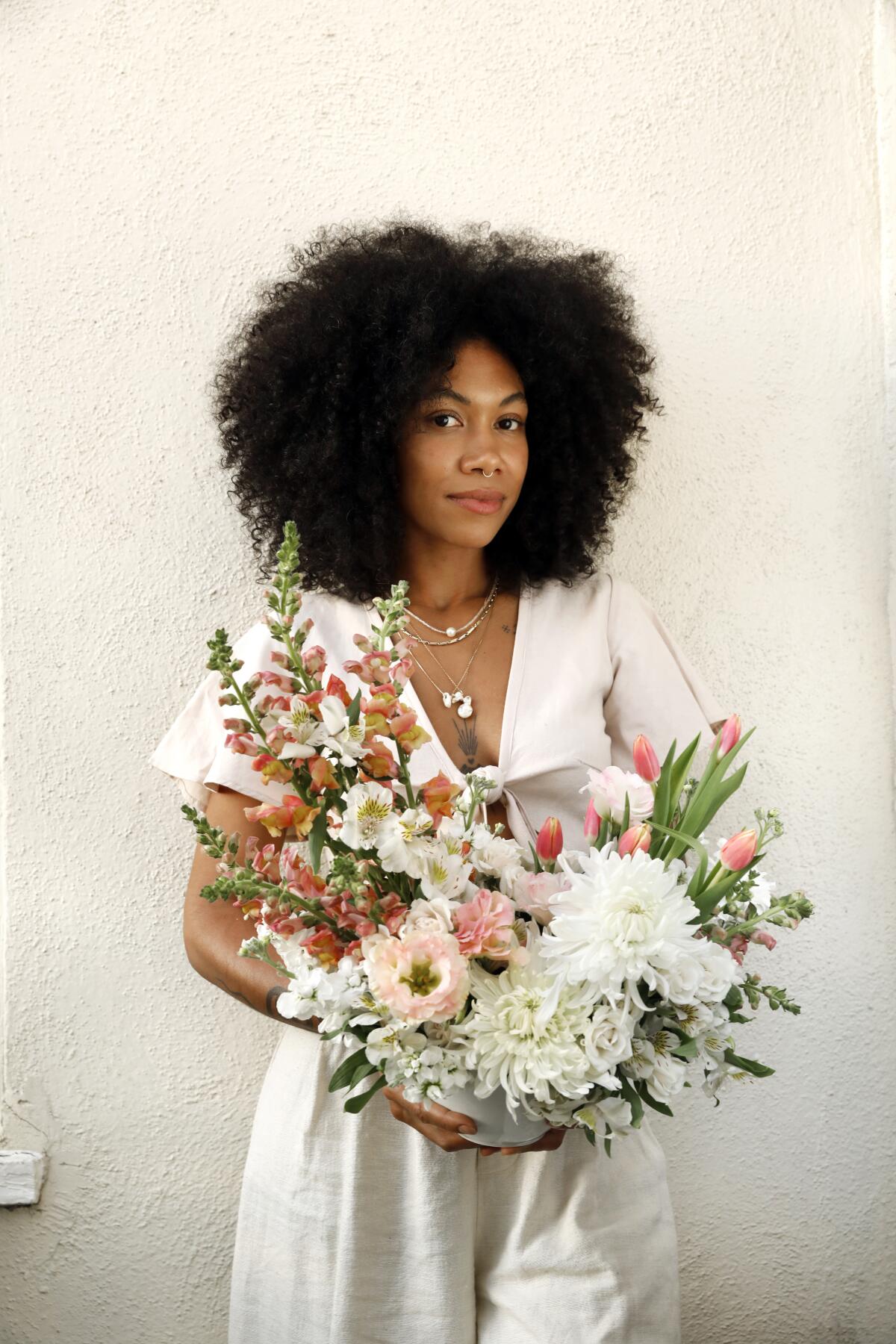
Schentell Nunn, 34
Schentell Nunn’s first job out of high school was working for the floral department of a grocery store in her small Vermont hometown, a perfect fit for her lifetime interest in arts and crafts. She went to San Francisco to study interior architecture and design and then to Brooklyn where she began designing jewelry. By the time she was 30, she wanted to be closer to family in California but needed a new creative focus. She remembered the pleasure of working with flowers and decided to focus her artistic energy on floral design at her West Adams studio, and on Instagram, @Offerings.co
“All the mediums I’ve worked in were based on the same idea, creating beautiful things that bring joy to people’s lives,” Nunn said. “Floral design has become more of a mainstream art form, because of social media, and it’s very appealing to work with flowers because they’ve been appreciated and celebrated forever.”
Her designs look like Renaissance still-life paintings, thick with color-drenched flowers. “Floral design is definitely like sculpting and painting, except you’re using flowers,” she said. “My work has a textural element as well, and it’s very romantic. I don’t believe flowers should ever be fussy, we should be honoring them, and displaying them in a way that’s really special and thoughtful. Hopefully that’s not too intimidating — you can make something pretty that doesn’t have to feel intense or heavy.”
When she’s creating orders, Nunn gives her clients, including luxury brands like Chanel, a color wheel to choose hues that are “joyful or soft,” she said, and those selections guide her decisions when she prepares to buy. “I choose what flowers are most vivid or appealing within those colors. I choose more on an energy palette.”
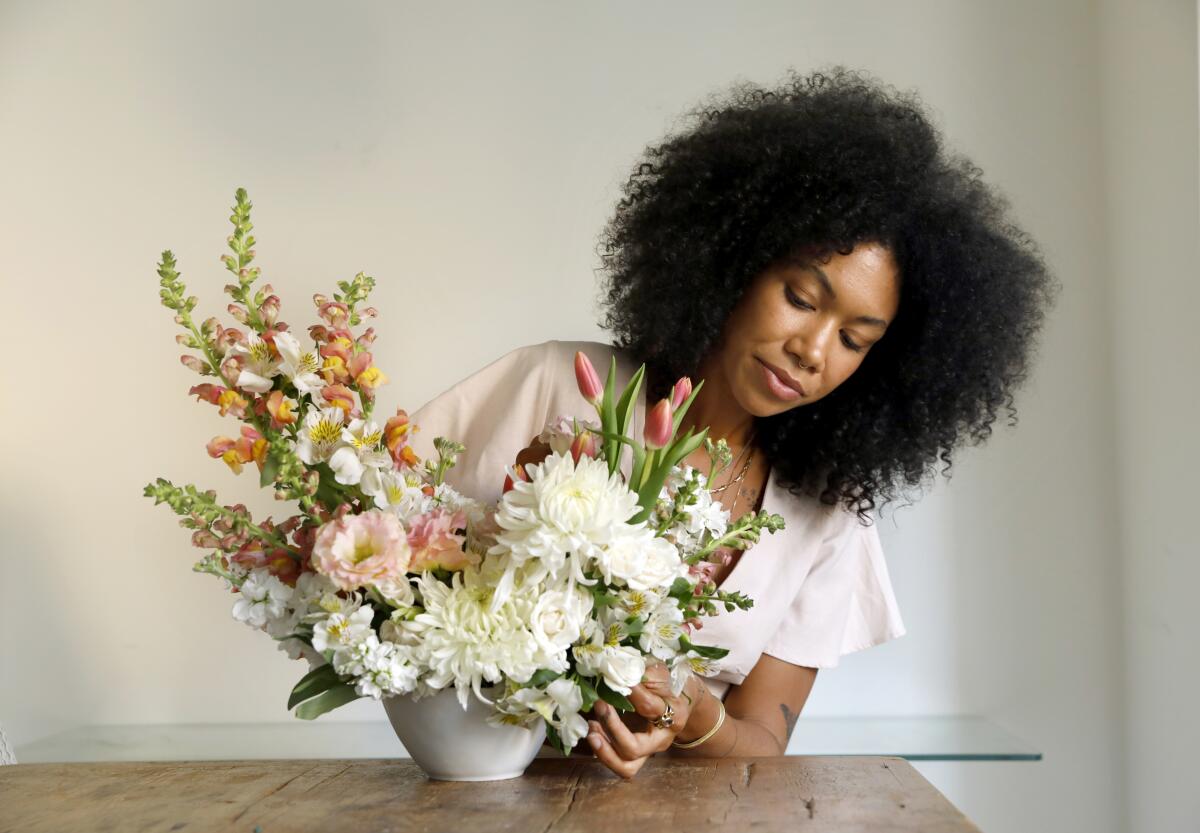
She also makes a point of looking around. The first Trader Joe’s she visited for her flower challenge had disappointing choices. But when she visited another store nearby, she found an inspiring selection of tall, salmon-and-yellow snapdragons and a bunch of tulips in similar shades, along with some fluffy white China mums, pink lisianthus and spray roses, creamy stock flowers and a few stems of white alstroemeria.
For assembly, Nunn started with a $4 Crate & Barrel cereal bowl and built a structure to hold her stems by crumpling a piece of chicken wire into a ball in the bottom of the bowl and creating a grid across the top out of waterproof floral tape, such as this two-pack by Oasis, which comes in green and clear. Then it was just adding the blooms, starting with her tallest stems, the snapdragons, on one side and a cluster of slightly shorter tulips at the other, creating “a cute little valley” where she could add her other flowers to create “a dreamy garden vibe, like the way it would grow in your front yard.”
More to Read
Sign up for The Wild
We’ll help you find the best places to hike, bike and run, as well as the perfect silent spots for meditation and yoga.
You may occasionally receive promotional content from the Los Angeles Times.
